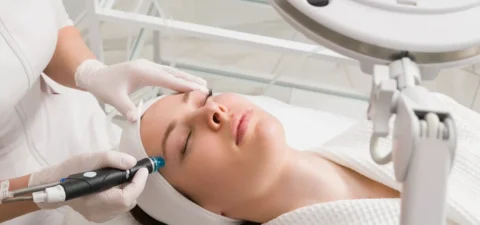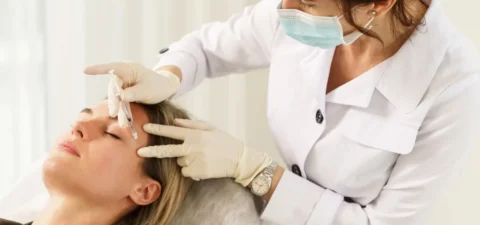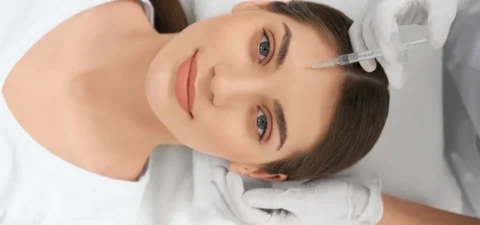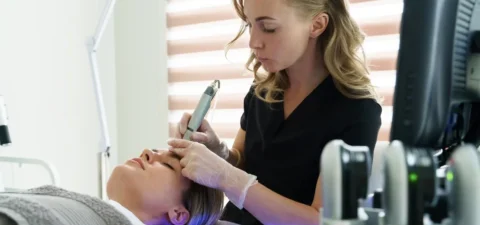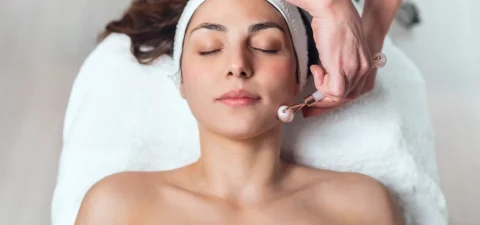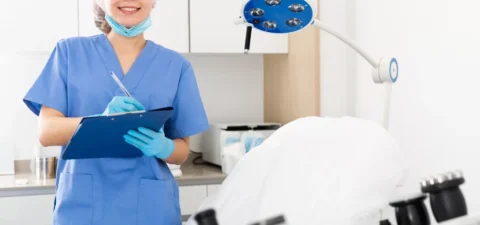For information only. Not meant as advice in any form. Please consult your medical professional or lawyer.
Becoming a medical aesthetician in New Jersey is a promising career for many cosmetic professionals – but it’s important to go through the hours of training needed to get your license. Fortunately, becoming an esthetician in NJ is relatively straightforward, even if it does require more than just choosing a beauty school to go to.
So how does one become an esthetician in NJ? Students will need to complete a training course from a recognized licensed esthetic school or cosmetology school in New Jersey and successfully pass both the practical exam and the written exam. After which, they can obtain their license from the New Jersey State Board of Cosmetology And Hair Styling.
How To Become A Licensed Esthetician In NJ: The Basics
There are four base requirements that anyone must meet to become an esthetic practitioner in NJ:
- At least 17 years old
- Have successfully completed high school (or the corresponding education equivalent)
- Complete 600 (minimum) to 1,200+ hours of instruction in cosmetology, manicuring, skin care training, or hairstyling
- Pass the examination by the state board
Once you’ve completed these requirements, you’re able to practice esthetics in New Jersey. You may choose to go at it on your own or partner with a medical spa or cosmetic clinic.
How Much Does An Esthetician School Cost In NJ?
The average cost of becoming an esthetician in New Jersey is around $8,000, but this cost will depend on the type of program and the specific beauty school that you’ll enter. If you’re looking to get your training abroad – perhaps from a Parisian beauty school – you’ll need to also account for accommodation and living expenses.
Keep in mind that this doesn’t take into account continuing education: if you want to get a specific cosmetology license or learn newer treatments, you’ll need to pay full price. Some schools may offer discounts on training if you study there exclusively for your treatments, so make sure you ask admissions for those details.
What Schools In NJ Have Esthetician Training?
While this isn’t a complete list as more and more beauty schools and cosmetology schools open in the area, here are the institutes that offer training programs for a medical esthetician:
- Rizzieri Aveda School
- Robert Fiance Beauty School
- Shore Beauty School
- Empire Beauty School
- Parisian Beauty Academy Paul Mitchell Partner School
- Innovate Salon Academy
These institutes have the training hours needed for you to finish the minimum required amount to obtain your esthetician license. They also offer advanced training programs for continuing education and can help you branch out into more treatments – for example if you’re looking to look into eyelash extensions or makeup application as an aspiring makeup artist.
How Long Is Esthetician School In NJ?
Esthetician school can last anywhere from five to eight months, as long as you manage to fill in the 600-hour quota set by the state board. Deciding whether you’ll complete your course full-time or part-time can make this timeframe longer or shorter, depending on your preference.
We highly advise that you do not fast-track your first 600 hours, as these contain the crucial skills and knowledge you’ll need to conduct esthetic treatments. These skills cross-transfer (even if you practice out of New Jersey) so it’s important to get these foundations right.
How Many Hours Does An Esthetician Need In NJ?
The minimum required hours for getting your esthetician license is 600 hours, distributed according to your beauty school’s program. You can go beyond 600 hours if you want to learn more treatments or pursue continuing education, but you’re qualified for a license after you finish the minimum.
Keep in mind that you still need to pass the practical exams and written exams after the 600 hour-mark: while you can be eligible for a license, finishing 600 hours does not mean you automatically get your license.
How Do I Get My Esthetician License In New Jersey?
Once you’re finished with the 600 hours of your beauty school and passed both written and practical exams, your institute should be the one to officially give you your license to operate as an esthetician.
Any issues about the validity of your license or other details should be brought to the New Jersey State Board of Cosmetology And Hair Styling.
What Can Estheticians Do In New Jersey?
Esthetics education is one of the more versatile career paths you can choose, as plenty of skin care treatments need an esthetician’s license to administer. Some estheticians choose to go at their careers as individuals, though for many it’s far easier to find steady employment with a salon or medical spa.
Some career tracks that you can consider include:
- Makeup artist: apply makeup in a variety of industries, from fashion to media styling
- Cosmetic buyer: join a corporate setting and be in charge of sourcing products to be sold in retail stores
- Salon esthetician: provide waxing, eyelash extensions, and facial treatments in salons across NJ
If you want to expand your options (or provide more advanced treatments), plenty of schools in New Jersey offer continuing education with a wide selection of specializations you can choose from.
FACE Med Store: Your Supply Partner As A Skin Care Specialist
New Jersey is one of the places where medical aestheticians are in high demand. Whether you charge by the hour or are employed by a medical spa, you’ll always be in demand. By going through the successful completion of esthetician school and pursuing continuing education, you can expect to have a long and fruitful career ahead of you.
As a medical esthetician, ensuring that you have the proper tools and supplies to administer your treatments is key to providing the best level of service that you can. FACE Med Store has been a trusted partner of medical estheticians around the country, helping them get everything from makeup and hair removal products to advanced training for better esthetics and skin treatments.
To learn more about us and our stocks, visit our website today.
